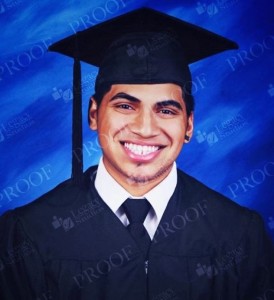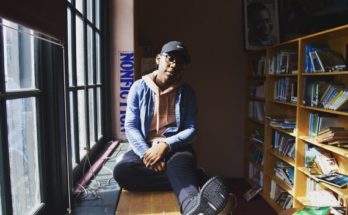
Eighteen-year-old honors student Vidur Beharry seems to do it all. He studies late into the night to maintain a 94 average. He plays baseball. He works as a valet to support his unemployed mother. He tries to be a committed boyfriend. He even volunteers.
But all of that perfection comes at a cost: Beharry suffers from sleep deprivation during the week and admits he lacks role models and the freedom to relax and enjoy his teenage years. His story shows the toll that financial insecurity can take on low-income teens who feel pressured to support their families. The stress of poverty can cause some teens and children to have to grow up too fast, taking on very adult-style responsibilities.
Teens who work during the school year experience higher stress levels than adults, according to a 2013 national study conducted by American Psychological Association. About 80 percent of high school and college students work while they are in school, according to a 2013 survey conducted by Citigroup and Seventeen Magazine.
Beharry’s schedule varies during the week, but on a typical weekday he wakes up at 5 a.m. to do his morning workout: training for baseball — a sport he can’t even afford to play. To join the team, Beharry needed health insurance, something his family couldn’t afford at the time (he now has insurance).
At 6 a.m., he showers, reads the New York Times on his phone while he eats breakfast, and prepares for the day. He then takes the bus from his home on E. Gun Hill Road in the Bronx to Dewitt Clinton High School. He greets his peers as he walks to his first period class: AP Statistics.
Beharry partakes in the honors program at Dewitt Clinton, a small high school that shares a large building with two other schools in the north Bronx. Although the New York City Department of Education considers the school subpar, it still has a good range of Advanced Placement offerings, which Beharry takes full advantage of.
Before lunch, Beharry takes AP Economics. During the mid-day break, he goes to the library to work on either a scholarship essay or check his emails. After this, he goes to his Latin class, then Forensics and lastly, AP Literature.
On a sunny afternoon in AP Literature, the teacher, Ann Neary, and playwright Judy Tate discussed a play the class saw live called Between Riverside And Crazy, which involved an ex-cop who struggled to remain in his rent-stabilized apartment and deal with house guests.
Beharry, who has short black hair and wears a black piercing in his left ear, sat in a corner next to three friends. In a characteristically thoughtful comment, he described one part of the play as “gimmicky,” but added that the playwright “really meant well.”
After Neary, 60, read Beharry’s college essay, she couldn’t believe that the smart student she had known for almost a year shouldered so much responsibility. “He’s like a teacher’s dream,” she said.
After school, Beharry rushed to his spring internship at Riverdale Neighborhood House at Van Cortlandt Park where he assists with office tasks. At 5 p.m., he cooks and eats dinner and does some house chores. He then completes as much homework as he can before 9 p.m.
That’s when his his part-time job at Star Valet in the Bronx begins.
At 9 p.m., Beharry waits for his ride to work. As a valet, he works from 9:30 to 1 or 2 a.m every day, sometimes driving as far as Connecticut. He often brings his statistical equations or economic term flashcards and studies during down time. Other evenings, he brings a book. After work, he tries to finish his homework. If he gets a heavy workload, he doesn’t sleep. If not, he wakes up at 5 a.m.
“I manage to juggle both work and school mostly because I know I need to,” he said. “I know I need to work, and I know I need to receive the highest marks within school to attend a top-notch university and secure a strong education with little to no financial burden.”
To relax, he hangs out with his girlfriend and friends, or plays sports and works out.
Beharry’s girlfriend, Raquel Miro, 17, has been friends with Beharry since freshmen year, when they took the same classes. They began dating at the end of that year.
“He always helps people. He’s a hard worker and cares a lot about people,” she said. “He’s always thinking about the little things to make me happy,” like picking her up at the end of her cheerleading practice.
Beharry lives with his Guyanese mother, who is currently unemployed; his father, also from Guyana, doesn’t support the family.
He described his father in mostly negative terms while calling his mother “a lost, loving, overprotective individual whose sole dream is to see all her children become successful.”
Since his two older sisters, Mainawatie Singh, 24, and Omawatie Beharry, 19, moved out, Beharry works to support his mother and himself.
“I chose to work because my family was placed in a situation where another, stabler source of income was needed,” he said.
His mother suffered from harassment and abuse when she lived with her husband, Beharry said. After they separated, Beharry and his mother and sisters fled and moved from shelter to shelter throughout New York City.
His sisters have set a model for Beharry by continuing on to college. Singh graduated from Hunter College, while Omawatie currently attends Wellesley College in Massachusetts as an English major.
Beharry’s past doesn’t prevent him from aspiring to attend college. Three faculty members at his school, including Neary, helped Beharry during the college application process. Yet he still wishes he had more role models.
“Growing up, I never had anyone with a really strong head on their shoulders mentor me, or guide me in the right direction,” he said. “I wish there were more people in the community that single-parent minority youth can idolize.”
Beharry’s family struggles are part of what motivate him to work so hard. “We never had much, and when I gain a degree and attain the accomplishment I’m yearning for, I’ll compensate for it.”
He feels that juggling work and school has prepared him for the real world, but sometimes wishes he could have more of a normal teenage existence.
He applied last fall to 25 colleges, ranging from Princeton to SUNY and CUNY campuses. He’s hoping to receive lots of scholarship offers. Elite colleges like Williams and Princeton accepted him with full scholarships, and now he has the enviable challenge of choosing between the two.
Beharry is eager to leave the Bronx and start a new life in another city. But once he graduates from college, he intends to return and give teenagers a strong male role model that he never had — helping them, as he puts it, “strive for the skies.”



